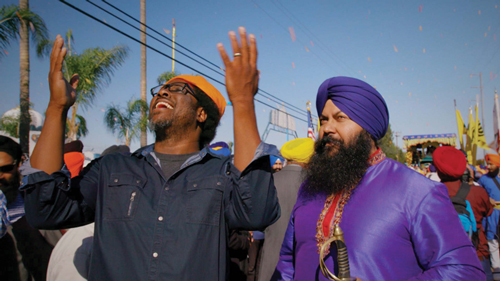
The CNN series “United Shades” has W. Kamau Bell, a Christian African-American comic learning about all the various race-based cultures around the United States. In an episode that aired in May, he focused on the Sikh culture and the many misconceptions of what it means to be Sikh.
I’ll admit that my first two impressions of Sikh culture as a child came from stereotypical sources. The first was the character of Punjab in the 1982 film of Annie, played by Geoffrey Holder (probably better known for his Dr. Pepper commercials). Punjab wore the turban but did not have the beard. He also didn’t speak much, and when he did it was with a really bad accent. The second was Gobinda (played by Kabir Bedi) in the James Bond film, Octopussy. At least in this film the character looked Sikh and the actor playing him is Sikh. Sadly he was really nothing more than an intimidating bodyguard with maybe two lines of dialogue.
United Shades gives us 40 minutes of what it means to be not only a Sikh, but a Sikh living in a country where many still have these false impressions of the culture.
There was a segment on the first hate crime that occurred after 9/11 happened to a Sikh man named Baldir Singh Sodhi who was simply standing in front of the gas station he owned in Phoenix. Hearing about this from the viewpoint of activist, lawyer and filmmaker Valarie Kaur, I was in tears. “What happened after 9/11 was that a new racial category was formed in the United States,” she says. “… that category is the ‘Muslim Terrorist’.” The man who was shot in Phoenix was a close family friend of Valarie’s. On the 15 year anniversary of his death, Valarie called the man who shot Sodhi. After a short conversation the man says that he hopes one day when he goes to heaven he will find Sodhi, hug him, and ask for forgiveness.
Valarie says, “Forgiveness is not forgetting. Forgiveness is freedom from hate.”
The documentary also shows the Sikh community in Yuba City, CA and its origins. It touches on Sikhs in the US Army through the words and experiences of Lt. Colonel Kamaljeet Singh Kalsi. It even shows how Sikh children tend to be treated through the innocence of Harpreet Singh’s son Dilzafer.
Along with the interview with Valarie Kaur, Bell speaks with actor Waris Ahluwalia and how he handles being Sikh in a Hollywood setting. “I’m black in the 50’s,” Waris explains. “I grew up in Brooklyn. For me, as I see myself, I’m an American. I am the guy next door.” He doesn’t want to be typecast, but it tends to happen. Honestly I only knew Waris’ work from two films: The Grand Budapest Hotel and The Inside Man. The latter had a scene where his character, a Sikh bank clerk, is grabbed by the cops and not only is his turban violently ripped off and his hair is grabbed and pulled. It’s tough to watch whether you’re Sikh or not, and I’m glad that both Waris was brave enough to portray that character and director Spike Lee was open to showing audiences something like this. Despite this Waris says he’s not a victim and doesn’t want to be typecast as one in the films he’s in.
After watching this documentary and the various personalities that Bell speaks with, I’m glad that he treats the people and their faith with the upmost respect. The Sikh American culture is probably one of the most misunderstood in the US, and this “United Shades” episode provides a perfect introduction for those who wish to learn.



